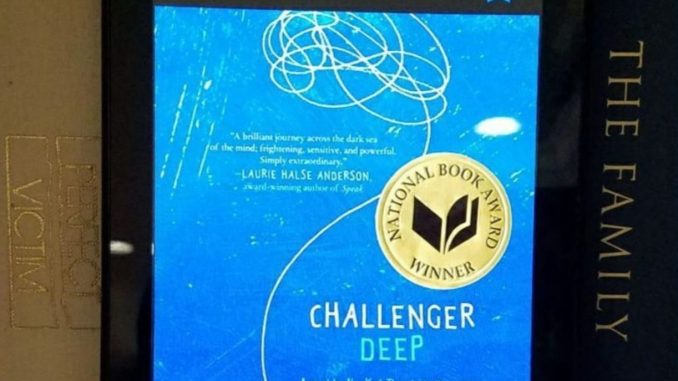
“Dead kids are put on pedestals, but mentally ill kids get hidden under the rug.”
– Neal Shusterman, “Challenger Deep”
“Challenger Deep” was a book recommended to me for Mental Health Awareness Month, as it explores a boy’s downward spiral through schizophrenia. I was already a fan of the author — I loved the “Arc of a Scythe” trilogy — so I decided that, though it was rather different from my usual reads, I would give it a try.
Caden Bosch is a teenage boy on a ship, traveling to the deepest point on earth: Challenger Deep, a part of the Marianas Trench. He spends his days illustrating the ship’s journey, walking the ship to keep it balanced, and trying to avoid his crewmates, especially the cruel parrot of the captain. Caden Bosch is also a high school student who is certain one of his classmates wants to kill him (though they have never spoken before). Additionally, he struggles with his art, and his family life becomes tense as they increasingly fail to understand him. Through a disjointed, very metaphorical narrative, readers follow both of his stories, piecing together what is real and what is delusion.
The short chapters and the unique narrative made the book a fairly quick read, as I was always intrigued as to what would happen next. It is also written mostly with symbolism, which is a theme in literature I absolutely love (such as in “This is How You Lose the Time War”). I am reluctant to describe too much of the book itself because I find it to be a fascinating journey to travel through blind, as I did, in order to feel its full impact.
I have a dear friend with schizophrenia, and from what I have learned of their stories, from the early beginnings to their ultimate institutionalization for almost a year, it lined up fairly well with their experiences. Though I do not have schizophrenia myself, I do have OCD, and it comes with its fair share of intrusive thoughts and delusions as well. When my OCD was at its absolute worst, I couldn’t say for certain what was truly happening and which of my beliefs were grounded in reality. Bosch, too, struggles with this, but to a much larger degree, and I was easily able to empathize with the isolation and frustration of it all. I enjoyed that the author didn’t try to glamorize mental illness or make it some sort of fun or quirky character trait, but rather represented it in a raw, confusing and upsetting way.
I do not think that readers need to be mentally ill or have mentally ill loved ones to find this book an intriguing read. Despite its confusing narrative and less-than-literal nature, the story is rather approachable. Though the book is rather sad, I think it’s a great, eye-opening fictional story of the realities of mental illness.


